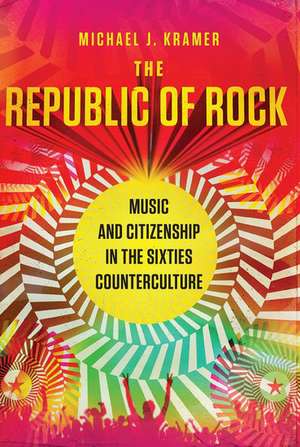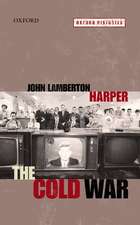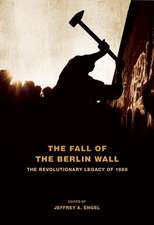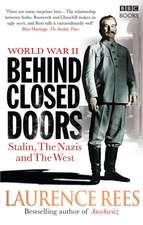The Republic of Rock: Music and Citizenship in the Sixties Counterculture
Autor Michael J. Krameren Limba Engleză Paperback – 9 feb 2017
| Toate formatele și edițiile | Preț | Express |
|---|---|---|
| Paperback (1) | 226.93 lei 31-37 zile | |
| Oxford University Press – 9 feb 2017 | 226.93 lei 31-37 zile | |
| Hardback (1) | 308.36 lei 31-37 zile | |
| Oxford University Press – 27 iun 2013 | 308.36 lei 31-37 zile |
Preț: 226.93 lei
Preț vechi: 276.02 lei
-18% Nou
Puncte Express: 340
Preț estimativ în valută:
43.42€ • 45.34$ • 35.94£
43.42€ • 45.34$ • 35.94£
Carte tipărită la comandă
Livrare economică 25-31 martie
Preluare comenzi: 021 569.72.76
Specificații
ISBN-13: 9780190610753
ISBN-10: 0190610751
Pagini: 306
Ilustrații: 40 illus.
Dimensiuni: 152 x 231 x 20 mm
Greutate: 0.45 kg
Editura: Oxford University Press
Colecția OUP USA
Locul publicării:New York, United States
ISBN-10: 0190610751
Pagini: 306
Ilustrații: 40 illus.
Dimensiuni: 152 x 231 x 20 mm
Greutate: 0.45 kg
Editura: Oxford University Press
Colecția OUP USA
Locul publicării:New York, United States
Recenzii
Throughout, Kramers book is a model of thorough research, with conclusions informed by an extensive body of archival sources and original interviews with musicians, as well as serious engagement with the major scholarship on rock and the counterculture.2 In short, The Republic of Rock is a groundbreaking study highly recommended to any reader interested in 1960s rock or the role of music in the Vietnam conflict.
...[A] provocative, always smart, and well-grounded account of the role rock music played in the lived experience of the sixties-era counterculture. ...Kramer has accomplished what few other historians of the counterculture have done: he has found stories of men and women actively involved in the cultural rebellion of the sixties era who struggled to turn their dreams into actions. Kramer enters this producerist counterculture through the agency of rock music.
The Republic of Rock offers valuable insights into the culture of rock music in San Francisco and Saigon during the 1960s. Kramer's book provides an informed and informative retrospective on a decade when sonic expectations for humanity soared, only to be brought back to earth by other musical depictions of ghetto lives, police harassment, mindless capitalism, drug abuse, and military madness.
Kramer probes deeply into the countercultural archives of art posters, underground newspapers, music, press releases, and interviews to establish how the rock music scene in San Francisco presented both a challenge to traditional values, while simultaneously embracing a hip capitalism which commercialized the counterculture. Kramer argues that the acid rock scene in San Francisco became a community in which music was a primary avenue through which to address issues of citizenship in what eventually was known as Woodstock nation.
Groundbreaking... Draws on a wide range of sources in exploring the role of music, drugs, and the counterculture in San Francisco and South Vietnam from the late 1960s into the early 1970s.
Given my particular interests in history and music, I cracked open The Republic of Rock: Music and Citizenship in the Sixties Counterculture thinking that I would be more reminded than enlightened. I was pleasantly surprised to have been incorrect in my expectations.
From happenings to alternative rock radio stations to music festivals Michael Kramer traces the close relationship of what he calls 'hip capitalism' and the emergence of niche marketing to utopian ideas of an open-ended public sphere with unblocked, unmediated sharing between all citizens. His book shows just how inseparable economic, political, and metaphysical ideas grew during the 1960s. He cinches his argument by turning to Vietnam. His chapter on the embrace of rock and soul music by the U.S. military is extraordinarily elegant. By looking into the rock groups that young Vietnamese formed, the book explores why aspects of U.S. culture has had such powerful international influence, even when U.S. political, economic, or military power was failing. The story told in this book shows the power of artists and audiences coming together.
In Republic of Rock, Michael Kramer skillfully examines rock music as an energizing 'circuit' connecting disparate communities of San Francisco hippies, Vietnam grunts, and South Vietnamese urbanites in a transnational 'sonic space' that fostered civic participation on young people's terms. Deeply researched and with a strong theoretical foundation, Republic of Rock helps readers to think expansively about music's power to define social relationships, in the United State and South Vietnam, in the Vietnam War and on the home front. Kramer's smart, witty prose and interdisciplinary approach to sixties counterculture, American military history, and global citizenship make this book suitable for classroom use but also a great read for rock fans of any generation.
...[A] provocative, always smart, and well-grounded account of the role rock music played in the lived experience of the sixties-era counterculture. ...Kramer has accomplished what few other historians of the counterculture have done: he has found stories of men and women actively involved in the cultural rebellion of the sixties era who struggled to turn their dreams into actions. Kramer enters this producerist counterculture through the agency of rock music.
The Republic of Rock offers valuable insights into the culture of rock music in San Francisco and Saigon during the 1960s. Kramer's book provides an informed and informative retrospective on a decade when sonic expectations for humanity soared, only to be brought back to earth by other musical depictions of ghetto lives, police harassment, mindless capitalism, drug abuse, and military madness.
Kramer probes deeply into the countercultural archives of art posters, underground newspapers, music, press releases, and interviews to establish how the rock music scene in San Francisco presented both a challenge to traditional values, while simultaneously embracing a hip capitalism which commercialized the counterculture. Kramer argues that the acid rock scene in San Francisco became a community in which music was a primary avenue through which to address issues of citizenship in what eventually was known as Woodstock nation.
Groundbreaking... Draws on a wide range of sources in exploring the role of music, drugs, and the counterculture in San Francisco and South Vietnam from the late 1960s into the early 1970s.
Given my particular interests in history and music, I cracked open The Republic of Rock: Music and Citizenship in the Sixties Counterculture thinking that I would be more reminded than enlightened. I was pleasantly surprised to have been incorrect in my expectations.
From happenings to alternative rock radio stations to music festivals Michael Kramer traces the close relationship of what he calls 'hip capitalism' and the emergence of niche marketing to utopian ideas of an open-ended public sphere with unblocked, unmediated sharing between all citizens. His book shows just how inseparable economic, political, and metaphysical ideas grew during the 1960s. He cinches his argument by turning to Vietnam. His chapter on the embrace of rock and soul music by the U.S. military is extraordinarily elegant. By looking into the rock groups that young Vietnamese formed, the book explores why aspects of U.S. culture has had such powerful international influence, even when U.S. political, economic, or military power was failing. The story told in this book shows the power of artists and audiences coming together.
In Republic of Rock, Michael Kramer skillfully examines rock music as an energizing 'circuit' connecting disparate communities of San Francisco hippies, Vietnam grunts, and South Vietnamese urbanites in a transnational 'sonic space' that fostered civic participation on young people's terms. Deeply researched and with a strong theoretical foundation, Republic of Rock helps readers to think expansively about music's power to define social relationships, in the United State and South Vietnam, in the Vietnam War and on the home front. Kramer's smart, witty prose and interdisciplinary approach to sixties counterculture, American military history, and global citizenship make this book suitable for classroom use but also a great read for rock fans of any generation.
Notă biografică
Michael J. Kramer teaches History and American Studies at Northwestern University, and writes about arts and culture at www.culturerover.com.















